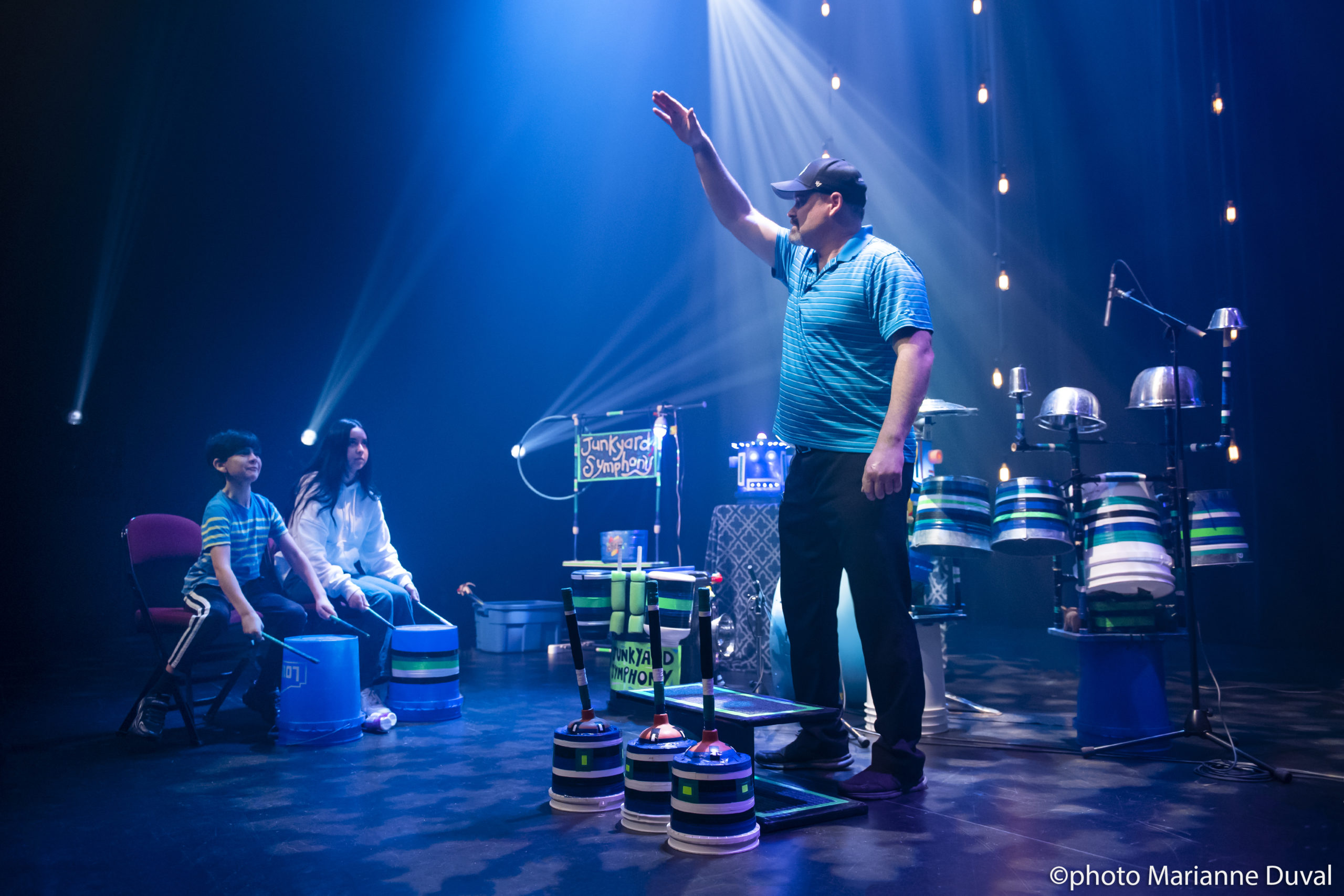Interview: Junkyard Symphony
By Jessica Ruano | January 4, 2022

This interview was originally published on Apt613.ca
Junkyard Symphony strives to promote environmental health and awareness through educational and extraordinary entertainment by reusing old ordinary objects that would otherwise be sadly destined for the junkyard. In their musical performances and workshops, the performers are the conductors while the audience is the symphony, so participants have the opportunity to experience rapid rhythms, awesome antics, clownish comedy, terrific tricks, magnificent magic, tons of talent, and plenty of participation! In this interview, Junkyard Jonny talks about finding instrumental gems at garage sales and inspiring students of all ages to do their very best.
MASC: Junkyard Symphony’s environmentally-focused workshops and performances encourage audiences to “reuse, reduce, recycle, and rock.” In a world inundated with hard discussions around climate change and the environment, how has the general understanding of your messaging changed since you first started over 25 years ago?
Our message has not changed and will likely never change. Reducing, reusing, and recycling will always be relevant, just as it will always be relevant to wear your seatbelt. We once had a teen from the United States suggest that our focus is out of date. “Recycling is so ’80s,” she said. It’s actually not. It’s just as important now as it was in the ’80s or ’90s or even the turn of the century. It will always be important because we are always going to create waste, and while we have partially learned to deal with that waste, we are still light years away from doing an excellent job of dealing with waste, in my opinion.
So we will continue to pass on our message of the 4 R’s and hopefully inspire people of all ages to find ways in which they can help, create efficient habits of dealing with waste, and have fun at the same time.

A happy audience member. Photo provided by MASC.
MASC: Tell us about the evolution of Junkyard Symphony. What types of materials were you using in the early years, and are you still discovering new ways to make instruments today?
In the early years we used a lot of heavy metal instruments such as a bathtub, a kitchen sink, pots and pans, and an oil barrel. While these objects had a great sound, they were very loud, so we have resorted to using mostly plastic items such as buckets, recycle bins, and garbage cans. We still have a few metal items, such as hub caps, garden pails, dog bowls, and cowbells, but they are accent instruments. Most of the beat comes from the plastic instruments. These two kinds of instruments complement each other.
We’ve also made didgeridoos out of PVC pipe, and we have a bass guitar made from pine two-by-fours. We are always experimenting with different objects and the sounds they make. We often like to go around to garage sales with our drum sticks to test out new sounds. When we tell people we are with Junkyard Symphony, they immediately know who we are and are happy to help us find something cool to add to our collection.

Junkyard Symphony with a friend. Photo provided by MASC.
MASC: At risk of getting political, you may have heard that a certain leader of a certain country pulled out of the Paris Climate Agreement last week. When drastic decisions like these feel out of our hands, how can ordinary people feel empowered to combat climate change?
We can definitely make our voices heard through voting and social media, but the best thing is to take action ourselves. We can think about all the things we do that contribute to climate change and find ways to mitigate those effects, such as walking, biking, or taking the bus instead of driving. Before the pandemic, ride-sharing was a popular tool, which we can hopefully get back to one day. Around the house, we can make sure we turn off lights that we aren’t using and we can update our windows so we are better insulated from the outdoor weather. There are literally thousands of little things we can do that will help which definitely add up in the end. It’s just a matter of making a list and trying our best.

Performing for a school audience, pre-COVID. Photo provided by MASC.
MASC: As a member of MASC, what do you gain through offering your workshops in schools and in the community?
With Junkyard Symphony, what we gain is the satisfaction that we have passed on our message and perhaps made a small difference in the grand scheme of things. People have come up to us years later and said that we have inspired them in some way or that we were a big influence in their lives. One person said he did really well on a test the next day after participating in a workshop because we inspired him to do his best. Another person decided to go into music in university as a result of drumming in our workshop. We might not be world-famous, but we have interacted with a lot of people, and hopefully brightened up their day.
MASC, especially, has been essential in bringing our workshops into the schools and community. Every March, we have done a promotion where we offer a rebate on our workshops. MASC has been extremely successful in expediting that information to potential clients, so much so that in the past couple of years there has rarely been a single day off for Junkyard Symphony in the month of March. It’s an eventful time for us. Being busy is a sign of success, therefore we are ever so thankful to MASC for keeping us busy!

Time to cheer. Photo provided by MASC.
MASC: Why do you think it’s important for our local community to have access to professional artists?
A community is healthy when it is welcoming to a wide variety of vocations, but a good benchmark is whether a community has good access to professional artists, and makes good use of those artists. Education is a picture and artists are the contrast and the colour. If you augment both those factors, you usually get a brighter, more vibrant picture, and therefore a better education. So let’s keep our artists employed!
Latest News
View All Articles



